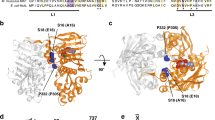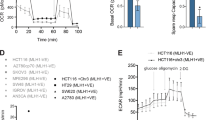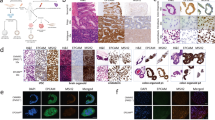Abstract
Loss of DNA mismatch repair has been found in tumors associated with the familial cancer predisposition syndrome HNPCC (hereditary non-polyposis colorectal cancer) and a subset of sporadic cancers. MSH2 deficiency abolishes the action of the mismatch repair system, resulting in a phenotype which is characterized by an increased accumulation of base substitutions and frameshifts, enhanced recombination between homologous but non-identical DNA sequences, and tolerance to the cytotoxic effects of methylating agents. In this study we describe an embryonic stem cell line in which the level of MSH2 protein is 10-fold reduced compared to that in wild-type cells. Remarkably, these MSH2-low cells were as resistant to killing by methylating agents as cells completely lacking MSH2, while they had retained almost maximal mismatch repair capacity as judged from their anti-mutagenic and anti-recombinogenic capacity and the absence of microsatellite instability. In contrast, MSH2-low cells were highly sensitive to methylation-damage induced mutagenesis. Thus, 10-fold reduced MSH2 protein levels render cells resistant to the toxic and highly sensitive to the mutagenic effects of methylating agents. This condition is not manifested by microsatellite instability and may have implications for both the etiology and treatment of cancer.
This is a preview of subscription content, access via your institution
Access options
Subscribe to this journal
Receive 50 print issues and online access
$259.00 per year
only $5.18 per issue
Buy this article
- Purchase on Springer Link
- Instant access to full article PDF
Prices may be subject to local taxes which are calculated during checkout



Similar content being viewed by others
References
Andrew SE, McKinnon M, Cheng BS, Francis A, Penney J, Reitmair AH, Mak TW, Jirik FR . 1998 Proc. Natl. Acad. Sci. USA 95: 1126–1130
Berardini M, Mazurek A, Fishel R . 2000 J. Biol. Chem. 275: 27851–27857
Bocker T, Ruschoff J, Fishel R . 1999 Biochim. Biophys. Acta 1423: 1–10
de Wind N, Dekker M, Berns A, Radman M, te Riele H . 1995 Cell 82: 321–330
de Wind N, Dekker M, Claij N, Jansen L, van Klink Y, Radman M, Riggins G, van der Valk M, van't Wout K, te Riele H . 1999 Nat. Genet. 23: 359–362
Drummond JT, Anthoney A, Brown R, Modrich P . 1996 J. Biol. Chem. 271: 19645–19648
Evans E, Alani E . 2000 Mol. Cell. Biol. 20: 7839–7844
Fink D, Aebi S, Howell SB . 1998 Clin. Cancer Res. 4: 1–6
Fishel R . 1999 Nat. Med. 5: 1239–1241
Friedman HS, Johnson SP, Dong Q, Schold SC, Rasheed BK, Bigner SH, Ali-Osman F, Dolan E, Colvin OM, Houghton P, Germain G, Drummond JT, Keir S, Marcelli S, Bigner DD, Modrich P . 1997 Cancer Res. 57: 2933–2936
Fritzell JA, Narayanan L, Baker SM, Bronner CE, Andrew SE, Prolla TA, Bradley A, Jirik FR, Liskay RM, Glazer PM . 1997 Cancer Res. 57: 5143–5147
Genschel J, Littman SJ, Drummond JT, Modrich P . 1998 J. Biol. Chem. 273: 19895–19901
Gradia S, Subramanian D, Wilson T, Acharya S, Makhov A, Griffith J, Fishel R . 1999 Mol. Cell 3: 255–261
Hemminki A, Peltomaki P, Mecklin JP, Jarvinen H, Salovaara R, Nystrom-Lahti M, de la Chapelle A, Aaltonen LA . 1994 Nat. Genet. 8: 405–410
Kane MF, Loda M, Gaida GM, Lipman J, Mishra R, Goldman H, Jessup JM, Kolodner R . 1997 Cancer Res. 57: 808–811
Karran P, Bignami M . 1992 Nucleic Acids Res. 20: 2933–2940
Lu SL, Akiyama Y, Nagasaki H, Nomizu T, Ikeda E, Baba S, Ushio K, Iwama T, Maruyama K, Yuasa Y . 1996 Jpn. J. Cancer Res. 87: 279–287
Lynch HT, Lynch J . 2000 J. Clin. Oncol. 18: 19S–31S
Shin KH, Park JG . 2000 Eur. J. Cancer 36: 925–931
Shin KH, Yang YM, Park JG . 1998 J. Cancer Res. Clin. Oncol. 124: 421–426
te Riele H, Maandag ER, Berns A . 1992 Proc. Natl. Acad. Sci. USA 89: 5128–5132
Toft NJ, Winton DJ, Kelly J, Howard LA, Dekker M, te Riele H, Arends MJ, Wyllie AH, Margison GP, Clarke AR . 1999 Proc. Natl. Acad. Sci. USA 96: 3911–3915
Umar A, Risinger JI, Glaab WE, Tindall KR, Barrett JC, Kunkel TA . 1998 Genetics 148: 1637–1646
Zhu W, Yamasaki H, Mironov N . 1998 Mutat. Res. 398: 93–99
Acknowledgements
We thank Lucie Boerrighter and Roelof Pruntel for assistance with microsatellite analyses. We thank Piet Borst, Meindert Lamers, Titia Sixma and Marjolein Sonneveld for comments on the manuscript. We acknowledge support from the Dutch Cancer Society (Grant NKI 98-1838 and the European Committee (Grant ENV4-CT97-0469).
Author information
Authors and Affiliations
Corresponding author
Rights and permissions
About this article
Cite this article
Claij, N., te Riele, H. Methylation tolerance in mismatch repair proficient cells with low MSH2 protein level. Oncogene 21, 2873–2879 (2002). https://doi.org/10.1038/sj.onc.1205395
Received:
Revised:
Accepted:
Published:
Issue Date:
DOI: https://doi.org/10.1038/sj.onc.1205395
Keywords
This article is cited by
-
Truncation of the MSH2 C-terminal 60 amino acids disrupts effective DNA mismatch repair and is causative for Lynch syndrome
Familial Cancer (2017)
-
Determining the functional significance of mismatch repair gene missense variants using biochemical and cellular assays
Hereditary Cancer in Clinical Practice (2012)
-
Progress and prospects: oligonucleotide-directed gene modification in mouse embryonic stem cells: a route to therapeutic application
Gene Therapy (2011)
-
Gene expression of the mismatch repair gene MSH2 in primary colorectal cancer
Tumor Biology (2011)
-
Mouse embryonic stem cells are hypersensitive to apoptosis triggered by the DNA damage O6-methylguanine due to high E2F1 regulated mismatch repair
Cell Death & Differentiation (2007)



